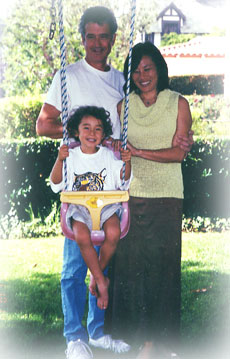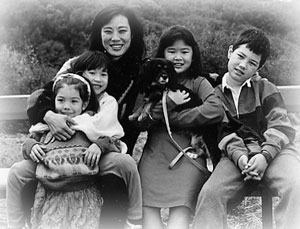|
ASIAN AMERICAN PERSONALITIES |
CONTACT US
|
ADVERTISING INFO
© 1996-2013 Asian Media Group Inc
No part of the contents of this site may be reproduced without prior written permission.
GOLDSEA | ASIAMS.NET | ASIAN AMERICAN PERSONALITIES
Manifest Destiny
PAGE 8 OF 8
JY: My sister is a lawyer. She was a journalist, then she became a lawyer. My brother is an engineer.

Janet Yang with husband Joe Bruggeman and son Yahn. |
GS: You must have been fairly prosperous by the time you became a teenager.
JY: We were solidly middle class. My mother worked at the United Nations so she retained her Chinese citizenship forever. So they actually paid for our tuition and paid for a lot of things because we were considered foreign residents. We were solid middle class, then upper middle class. They started lower middle class, they became middle class and transitioned to upper middle class -- typical American dream
GS: Are they still alive?'
JY: My father has passed away. My mother is alive.
GS: Are you the youngest?
JY: I am.

Yang with nieces and nephew. |
GS: Where do you live now?
JY: I live in Santa Monica.
GS: We see that you liked to go hiking and do yoga Where do you hike?
JY: I used to live in Topanga, so I'd hike the trails in Topanga. I haven't been hiking as much recently, so I do a lot of yoga.
GS: You weren't married a while ago.
JY: I've been married for some time. It's been five years now.
GS: What's his name?
JY: Joe Bruggeman.
GS: How did you meet?
JY: We were both passengers on a private plane that was being piloted by someone who had literally just gotten his pilot's license. He didn't seem to know what he was doing. I sought comfort in the arms of this man.
CONTINUED BELOW
GS: Do you have any kids yet?
JY: We have a child who just started kindergarten, a son.
GS: Do you see any Hollywood bias against employing Asians behind the camera (i.e., producers, directors, writers, etc) or is that phenomenon limited to actors?
JY: I do a lot of mentoring, either through IFP (Independent Features Project), or CAPE (Coalition of Asian Pacifics in Entertainment). I am always looking for good material and talent that I can recommend to places like Sundance. I would say there is a real blossoming of talent and a more concerted than ever search for this talent. I meet AA filmmakers that want to exclusively make AA films and others that want to make big studio movies. Both ends of the spectrum now seem possible. A young AA filmmaker just got hired by Sony to do a remake of the musical Bye Bye Birdie straight out of film school based on his short film. Justin Lin just got his five-figure budgeted film (Better Luck Tomorrow) picked up by Paramount.
And of course there's this rash of remakes which at least gets people paying attention to what's going on on the other side of the Pacific. But for my taste, the goal is to make films with Asian content seen by international audiences, and not just whitened and regurgitated.
I actually find there's relatively little bias toward Asians behind the camera, while there is still tremendous bias against Asian in front of the camera.
GS: It seems there has been an influx of Hollywood producers and executives who have attended Ivy League colleges. Do you think an Ivy degree confers an advantage on people seeking careers in Hollywood as producers, directors and writers?
JY: I suppose having an Ivy League education sets one apart as it would in almost any competitive industry. There's also the networking factor, though honestly I knew not a soul when I first came to L.A. Only over the years have I discovered that people I've worked with share my alma mater. College was many moons ago.
GS: Do you see a growth in the influx of Asians from Ivy schools?
JY: I'm not really keping track of where everyone's gone to school, but I can only imagine that there's a large degree of Ivy Leaguing. Our parents need at least that much to hold up their heads.
GS: Do you see a growth in the number of Asian Americans entering the movie industry?
JY: There are many, many more Asian Americans working in the industry today than ever, and probably at a ratio higher than exists in the population at large. It seems that virtually every studio, network, agency, etc. has at least a few. Many production companies do too, and although not many individuals have ventured out on their own as I have, I'm sure that time will come. Again, our reputation as being good worker bees has worked to our advantage, but there's probably an element of "hip" added to the overall perception these days. A lot of d-girls and d-boys are sis's and bros'.
In contrast, there are hardly any Blacks and Latinos in the corporate or company ranks, but then they're much more prominent in front of the screen. This has everything to do with perception too, which gets us back to the reason for needing to change people's perceptions via films and tv.
| “I actually find there's relatively little bias toward Asians behind the camera, while there is still tremendous bias against Asian in front of the camera.” |
